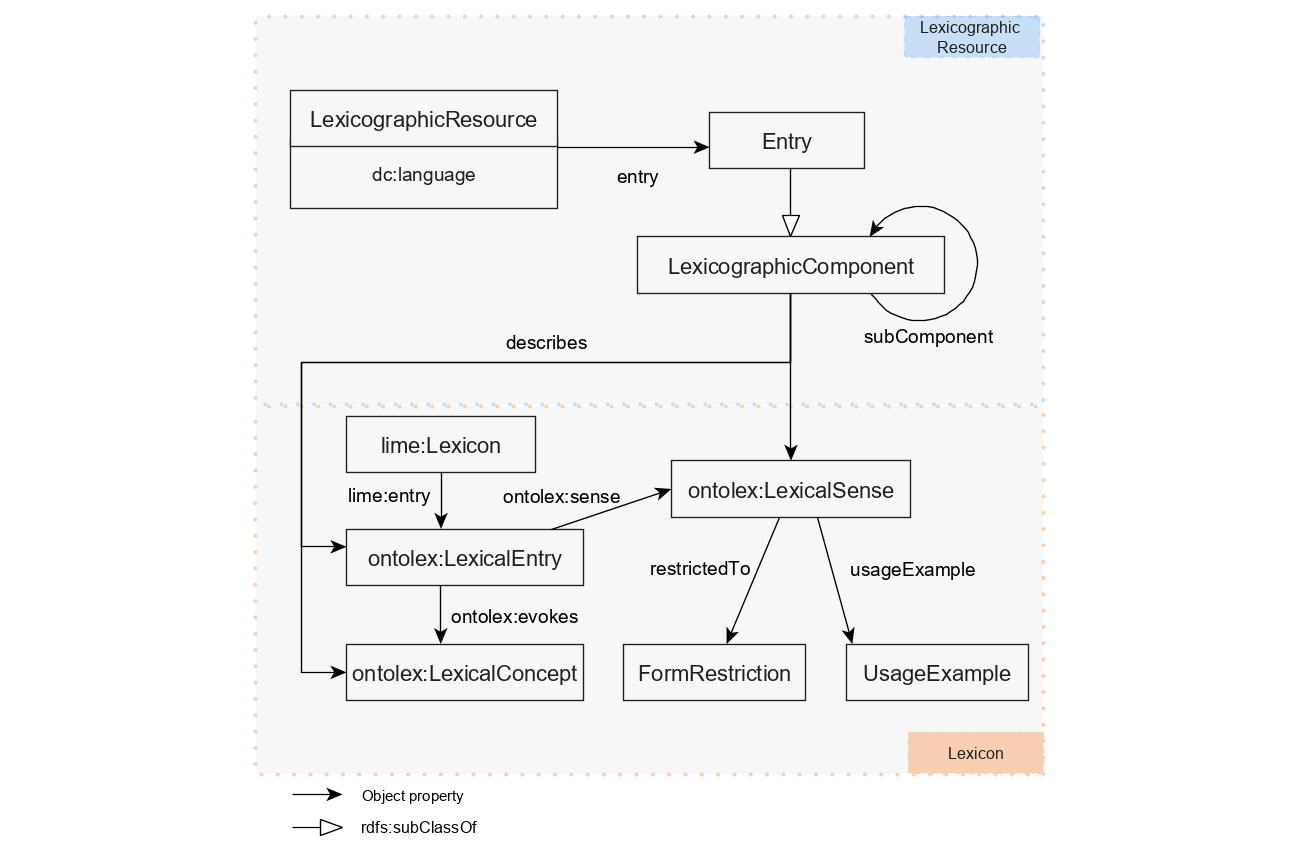- From: Julia Bosque Gil <jbosque@unizar.es>
- Date: Mon, 17 Jan 2022 13:43:48 +0100
- To: Christian Chiarcos <christian.chiarcos@gmail.com>
- Cc: Sander Stolk <ssstolk@gmail.com>, Jorge Gracia del Río <jogracia@unizar.es>, public-ontolex <public-ontolex@w3.org>
- Message-ID: <CA+B92MtYGuDCJvzMsS_PuhGxuKik4QKn0C_xt9ChEL4LTUxQMQ@mail.gmail.com>
Dear all,
@Sander: Fixed, thank you for spotting that ;) New version attached.
@Christian: Yes, the use of color in the original diagram and in this one
is the same. The color difference between the areas is used to mark the
elements belonging to the lexicon (orange) and structural (blue) layers.
Except for FormRestriction and UsageExample in the orange area, all other
lexicog elements are indeed in the structural/blue one.
Best,
Julia
El lun, 17 ene 2022 a las 11:02, Christian Chiarcos (<
christian.chiarcos@gmail.com>) escribió:
> Thank you Julia, I think it looks really great.
> Did the original diagram have a difference in color between concepts
> introduced in lexicog and core model concepts?
>
> All the best,
> Christian
>
> Am Mo., 17. Jan. 2022 um 10:22 Uhr schrieb Sander Stolk <ssstolk@gmail.com
> >:
>
>> Dear Julia,
>>
>>
>>
>> Please reverse the arrow for ontolex:evokes. :)
>>
>>
>>
>> Best wishes,
>>
>> Sander
>>
>>
>>
>> *[image: Universiteit Leiden]*
>>
>>
>> *Sander Stolk, MSc MA*PhD Researcher Digital Humanities
>> Home: Profile
>> <https://www.universiteitleiden.nl/en/staffmembers/sander-stolk> |
>> Twitter: @ssstolk <https://twitter.com/ssstolk> | Evoke: evoke.ullet.net
>>
>>
>>
>> *From: *Julia Bosque Gil <jbosque@unizar.es>
>> *Sent: *14 January 2022 14:11
>> *To: *Christian Chiarcos <christian.chiarcos@gmail.com>
>> *Cc: *Jorge Gracia del Río <jogracia@unizar.es>; public-ontolex
>> <public-ontolex@w3.org>
>> *Subject: *Re: lexicog and LexicalConcepts
>>
>>
>>
>> Dear Christian, Jorge, all,
>>
>> Please find attached a possible modification to the diagram including
>> LexicalConcept.
>>
>> Best regards,
>>
>> Julia
>>
>>
>>
>> El mié, 5 ene 2022 a las 16:57, Christian Chiarcos (<
>> christian.chiarcos@gmail.com>) escribió:
>>
>> Dear Jorge,
>>
>>
>>
>> happy New Year from my side, as well.
>>
>>
>>
>> Am Mi., 5. Jan. 2022 um 09:26 Uhr schrieb Jorge Gracia del Río <
>> jogracia@unizar.es>:
>>
>> Dear Christian, all,
>>
>>
>>
>> Happy New Year! As for including LexicalConcept in figure 1 of the
>> lexicog specification, that's an interesting point; however, I would tend
>> not to overload the diagram. From the definition of lexicog:describes it's
>> clear that using ontolex:LexicalConcept as range is perfectly valid. But
>> other elements as well (e.g., for etymology description). Thus, I'd not be
>> exhaustive and just keep LexicalSense and LexicalEntry in the figure as the
>> most frequent ones ("there is beauty in simplicity").
>>
>>
>>
>> Yet another reason for resurrecting lemon:Element as a generalization
>> over Entry, Form, Sense and Concept ;) That would also massively simplify
>> the FrAC diagram. But that ship has sailed, I guess.
>>
>>
>>
>> But I have no strong opinion against including LexicalConcept in the
>> figure, if this is perceived as an important gap.
>>
>>
>>
>> I think it could play a role in terminology. It seems to be quite
>> controversial what a "term" should be, i.e., a conceptual unit (>
>> ontolex:LexicalConcept, but terminologists seem to feel this is too much of
>> a messy category to build on) or a representational one (> lexicog:Entry),
>> but if the latter, it must be closely associated with a conceptual unit,
>> and that could be done by the lexicog:describes relation or a designated
>> subproperty. An ontolex:LexicalConcept would then be a natural candidate,
>> but (thanks to the open range) not the only one. But while we don't need
>> exhaustivity against the world, not having that against the core model
>> looks like this particular usage is discouraged.
>>
>>
>>
>> Best,
>>
>> Christian
>>
>>
>>
>>
>>
>> Best regards,
>>
>> Jorge
>>
>>
>>
>>
>>
>> El mié, 8 dic 2021 a las 9:01, Christian Chiarcos (<
>> christian.chiarcos@gmail.com>) escribió:
>>
>> Dear all,
>>
>>
>>
>> as the range of lexicog:describes is left open, could we add
>> LexicalConcept to
>> https://www.w3.org/2019/09/lexicog/img/ontolex-lexicography-module_v.5.png?
>> Not to have that shown there seems like a logical gap, esp. if you have a
>> lexicographic resource that is organized according to conceptual criteria
>> (say, traditional Chinese dictionaries, organized by radical).
>>
>>
>>
>> Thanks a lot,
>>
>> Christian
>>
>>
>>
>> --
>>
>> Julia Bosque-Gil
>>
>> Aragon Institute of Engineering Research (I3A)
>>
>> University of Zaragoza
>>
>> Pronouns: she/her
>>
>>
>>
>
--
Julia Bosque-Gil
Aragon Institute of Engineering Research (I3A)
University of Zaragoza
Pronouns: she/her
Attachments
- image/png attachment: B379BDDFDE5546CA87845561BEB805AA.png

- image/png attachment: ontolex-lexicography-2022-01-LexicalConcept.png

Received on Monday, 17 January 2022 12:44:17 UTC